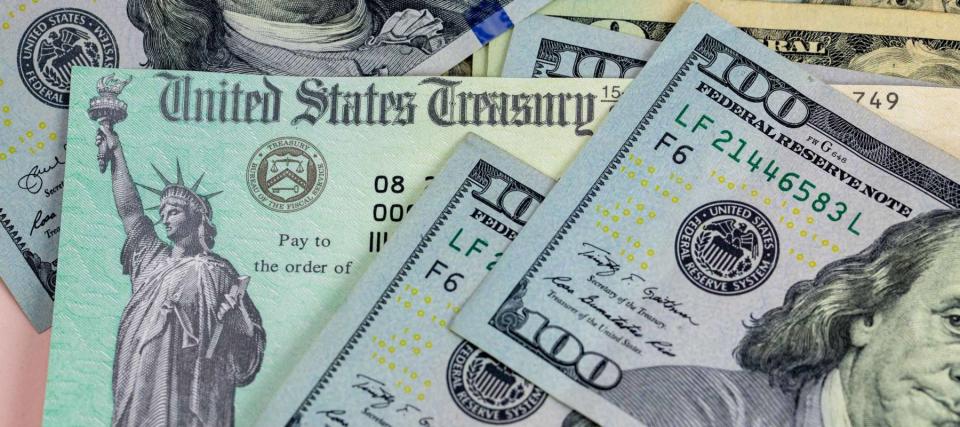Did a stimulus check miss you? Here are 7 reasons you can still be owed a payment

The IRS says it distributed over 171 million of the pandemic's third stimulus checks, which started going out way back in March and were worth up to $1,400 each. The tax agency says Americans received roughly $325 billion in direct relief payments, made possible by President Joe Biden's $1.9 trillion COVID rescue package.
But none of that means a whole lot if you're still waiting for your money — and are eager to use it to pay bills, reduce your debt, save or invest.
What's happened to your stimulus check? Here are eight potential reasons for the long and frustrating delay.
1. The stimulus checks went out in 'batches'

The IRS was in a colossal bit of multitasking last spring — up to its eyeballs in both tax returns and the millions of stimulus checks.
Rather than completely overwhelm itself and risk creating an ugly backlog of payments, the tax agency opted to deliver the stimulus funds in batches.
The most recent batch of cash, announced by IRS in July, totaled more than $4 billion and included about 2.2 million payments. Officials never formally declared an end to the distribution.
2. A debt collector took your money
If you haven't seen your stimulus money, it could mean someone else has beaten you to the punch. The first two relief payments were off limits to debt collectors, but not the third one.
Because Biden's relief bill was fast-tracked through Congress using a convoluted budget process, a legislative loophole allowed creditors to garnish your stimulus check. The cash could be seized to pay several kinds of debt, though not tax debt or back child support.
If you were at risk of losing your stimulus payment because of overwhelming debt, a lower-interest debt consolidation loan might help you take better control over what you owe — and pay it off more quickly.
3. You moved or changed your bank account

Moving can be a hectic time. Notifying the IRS of your new whereabouts may not have been at the top of your list of priorities when you were packing, but if you didn't update your address with the agency, it sent your check to wherever it previously mailed your tax refunds.
And if the IRS did indeed route your payment to an old address, the check would need to be reissued. Which means a longer wait.
Or, if you switched bank accounts, the IRS wouldn't have your new account information on file unless you provided it. When you’re scheduled to receive a direct deposit but the IRS doesn’t know where to send it, a paper check or debit card must be mailed to you instead. And that can take weeks.
4. You don’t qualify for a stimulus check anymore
After already spending trillions of dollars on propping up the U.S. economy during COVID-19, Congress took a more measured approach when debating what to include in the last round of stimulus.
So, individuals making more than $80,000 and couples earning over $160,000 got zilch. Eligibility was based on adjusted gross income, which is a household's taxable income before subtracting the standard deduction or itemized deductions.
The previous thresholds for getting a stimulus check were $100,000 for single taxpayers and $200,000 for couples who file jointly.
5. You were supposed to get a paper check or debit card

Americans in line for direct deposits almost surely received their payments before those who were slated to get debit cards or good ol’ paper checks, which can take weeks to reach their intended recipients.
Not sure how your payment was distributed? You can use the IRS "Get My Payment" tool to see how your money was to be delivered and whether it has been sent.
If the tax people had you down for a check or debit card, you'd better hope you didn't accidentally throw away your envelope from the IRS. When the first $1,200 stimulus checks went out in 2020, some recipients mistook their mailed checks or debit cards for junk mail — and tossed them.
6. You didn’t taxes file taxes last year — or the year before
Not everyone is required to file federal income taxes every year. For example, if someone brings in less than $12,400 a year, doesn’t have additional self-employment income, is single and under age 65, they didn't have to file a tax return for 2020.
But if you hadn’t gotten yourself onto the IRS' books recently, and you’re not a Social Security or railroad retirement beneficiary, the tax agency didn't have a record of your stimulus check eligibility.
You can use a reliable tax software program to get yourself on the IRS' radar. When you've got money coming, that’s not a bad place to be.
7. Your bank may be holding up the money

In at least some cases, the IRS apparently "future dated" the payments, similar to the way a consumer might post-date a check. And, your bank may not have made your stimulus check money available to you until the tax agency's official payment date.
That was the case for customers of JPMorgan Chase and Wells Fargo, who didn't receive the cash in their accounts until days after it was distributed. The banks said they were observing the IRS "effective date" for the payments, but some people threatened to close their accounts in protest.
The omicron COVID surge has renewed speculation over whether there will be a fourth stimulus check, but Washington has shown little interest. So if you receive a delayed $1,400 third payment, use it wisely — maybe by putting it to work with one of today's popular investing apps.
What if your money is still missing — and you need it now?

If it appears your stimulus check is still held up, or if the new income guidelines meant there was no cash for you, there are several options if you seriously need the $1,400 today.
Slash your insurance bills. Car insurance companies have been handing out discounts to drivers who are on the road less through the pandemic. Not yours? Sounds like it’s time to shop around for a better deal from a more flexible provider.
Reduce your mortgage payments by refinancing. Mortgage rates remain historically low, and refinancing your existing mortgage could reap big savings — typically hundreds of dollars a month.
Trim your budget and “make your own” stimulus check. By finding a few creative ways to cut back, you might rearrange your budget to find another $1,400. Use cloth instead of paper napkins, refill water bottles instead of buying bottled water, and use your own coffee cup to get a discount at your local cafe. And, download a free browser extension that will automatically hunt for better prices and coupons when you shop online.
This article provides information only and should not be construed as advice. It is provided without warranty of any kind.
